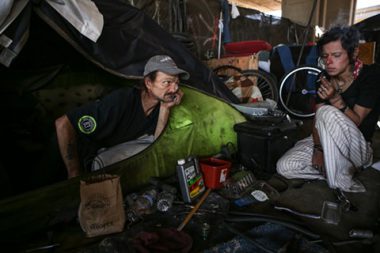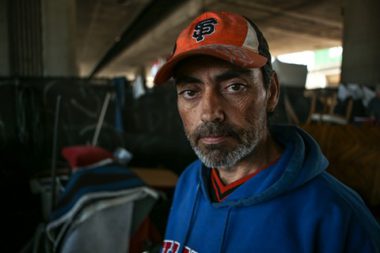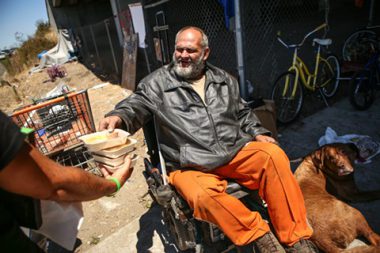East Bay Homeless Campers Accuse Caltrans of Illegally Confiscating and Destroying Valuable Property – and Even Family Heirlooms
Original article can be found in East Bay Express.
Written by Darwin BondGraham
‘People who have lost almost everything, why take their last things and throw them away?’

Bridgette Parker is suing Caltrans for illegally throwing her property in the trash, including treasured valuables given to her by her mother and grandmother.
Bridgette Parker sat in the back of an Alameda County courtroom
on a recent Thursday morning, waiting to argue her case in small-claims court against the California Department of Transportation, or Caltrans. She lives on the streets of this once affordable city, and stores her property in suitcases and plastic Rubbermaid bins behind a freeway-bridge column in West Oakland. On January 27, Parker lost almost everything when a Caltrans crew swept her campsite. She pleaded for them to return her boxes, but she said the crew threw it all into a trash compactor.
“They left no notice saying they’d been by and taken my stuff,” Parker explained. “Other times, when they’d been by, they’d let me move my stuff off their property before they cleaned.”
She said she lost her grandmother’s necklaces, her mother’s cashmere jacket, and many other valuables and heirlooms worth thousands of dollars. She believes Caltrans assumed her things were worthless because, to the agency, she’s just another nameless transient.
Her case is unusual, however, because she’s suing Caltrans. But numerous people who live near the freeways of Oakland and Berkeley say Caltrans frequently destroys their belongings during routine sweeps of homeless camps. Many have lost their most valuable possessions, as well as family pictures and important records such as identification cards or medical documents.
Homeless campers say the agency almost always gets away with it. And advocates argue that what Caltrans is doing is illegal.
“Under the Constitution, the Fourth and Fourteenth Amendments, the government cannot unreasonably seize people’s belongings,” argued Elisa Della-Piana, the legal director for the Lawyers Committee for Civil Rights of the San Francisco Bay Area. She said that courts repeatedly find the practice of taking or throwing away homeless people’s belongings unconstitutional.
But Caltrans spokesman Bob Haus reminded that freeway property isn’t designed for human habitation. He said they’d need to install running water and sanitation to make it safe. “What you have is bottles of urine, feces, and it’s attracting vermin,” he said of the homeless camps. “After we remove all the detritus, we have to clean the area with bleach because there’s bio-waste on the ground.”
Haus also noted that anyone living on Caltrans property is trespassing, and that the agency has the right to restrict access.
Many of the homeless campers actually don’t mind the recurring cleanings. There are few public trash cans and hardly any public bathrooms within walking distance of most camps. At night, they say trucks often pull up to illegally dump leftovers from evictions, construction sites, and even hazardous waste such as used motor oil. Some of the homeless campers even complain about piles of trash from their neighbors.
But nearly every person camping at East Bay freeways has a story of losing precious items during the sweeps.
Throwing Away Memories
A couple months ago, Jeffery Hill said that he returned to the Brush Street encampment and spotted a Caltrans crew. He ran across the street and “begged” them to stop throwing his stuff away.
“A supervisor came over after maybe three-quarters of my stuff had already been thrown in the garbage truck,” Hill recalled. “I’m talking boots, clothing, tools. Some of those tools were given to me by my best friend, Jeremy White.”
White, a beloved resident of the Brush Street camp and a respected mechanic, was profiled in an Express story two years ago. He recently died in an accident, and the tools were the only objects Hill had to remind him of his departed friend.
That day, Hill was unable to retrieve his belongings. “People who have lost almost everything, why take their last things and throw them away?” he asked.

Homeless camper Jeffery Hill said Caltrans has trashed his belongings three times.
The memorabilia included vinyl records of the Dick’s Picks collection, a 36-volume set her mom handed down to her. Stormie said they were worth thousands.
But it was also the sentimental value that mattered. “They were leaving when I saw them with all my stuff in the truck. I immediately knew it was ruined,” she remembered.
She said she tried pulling her belongings from the jaws of the compactor, but a California Highway Patrol officer put her in handcuffs as the truck drove away.
Also pulverized in the trash was a purse containing $400 and a key to a storage unit where she kept a motorcycle, she said. She couldn’t make the next payment on the unit, so she lost the cash and the motorcycle.
Lance Caruthers, another Brush Street camper, lost a laptop computer, clothing, a tent, pictures of his children, and the only photographs he had of his wife, who died four years ago. He was unable to move his stuff during the 72-hour warning period Caltrans gives before they conduct a sweep.
“I had been in the hospital,” Caruthers explained. “I was going back to my tent — I still had the hospital wristband on — and I saw them throwing my stuff away.”
Caruthers asked the Caltrans workers if he could grab some of his remaining things from his campsite and off the trucks, but workers allegedly told him no. But before they left, Caruthers said a Caltrans worker grabbed his backpack out of the garbage truck and handed it to him.
“She was really sweet,” said Caruthers, who appreciated this act of humanity. “My identification, my birth certificate — that was in [the bag].”

Lance Caruthers lost his laptop, tent, pictures of his children — and the only photo of his departed wife — when Caltrans conducted a sweep of the homeless camp at Brush Street near Interstate 880.
The problem is that Caltrans workers can’t know if there are valuables inside, say, a backpack. “For health and safety reasons, we can’t look inside,” Haus explained. “It’s best to limit physical contact with the items, so if it’s a backpack, we’ll just throw it away.”
But many homeless campers say they hide valuables in clothing or other seemingly worthless objects, otherwise thieves will strike.
Brush Street camp resident Marjo said he had tools destroyed by Caltrans in June. He was sleeping at a nearby friend’s house when another resident of the camp alerted him to a sweep. He biked to the camp and saw a trash truck parked in front of his tent; workers were throwing garbage, but also his belongings, in the truck.
“I lost three sets of sails, tools, bike parts, and a lot of new clothes I had gotten,” Marjo said. A lot of what he lost was packed in bags.
“If it’s not Caltrans taking your shit, it’s other thieves,” he said.
He said he’d never witnessed Caltrans crews tell anyone at the Brush Street camp how to recover confiscated items from storage.
“Caltrans is very, very gangster about it,” he described the sweeps.
Displaced From Everywhere
Back at Bridgette Parker’s hearing, the court clerk waived his arms to get everyone’s attention. There was no judge, the clerk explained, and their cases would instead be argued before a local attorney acting as a temporary judge.
But Parker wanted a judge, not some replacement. “My case is too important,” she told the clerk.
Osha Neumann, a human-rights attorney from the East Bay Community Law Center who accompanied Parker to the hearing, also told the clerk that Parker wanted a real judge, so the clerk rescheduled. Two Caltrans attorneys got up from the front row and hastily left the courthouse ahead of Parker and Neumann.
The attorney said he’s documented upward of forty instances where Caltrans, and sometimes the cities of Oakland and Berkeley, has taken and destroyed people’s property. “The stories we’re hearing from people are just astounding,” he said.
Della-Piana with the Lawyers Committee for Civil Rights explained that she has seen this pattern of behavior previously from Caltrans. In 2006, she was part of a team of attorneys who helped roughly 350 people sue the City of Fresno and Caltrans over the confiscation and immediate destruction of their property. Fresno and Caltrans weren’t posting advanced notices for sweeps, either.
A federal judge wrote that the city and state both violated constitutional protections against unreasonable seizure. In a 2008 settlement, Caltrans agreed to a set of rules meant to protect people’s property against immediate destruction, including the guidelines that any sweep would be noticed 72 hours in advance, and that belongings would be stored for ninety days. But the settlement agreement expired after five years, and now homeless advocates say that Caltrans and local governments are back to their old ways.
“A federal judge told them what they’re doing is illegal, and they entered into a consent decree, but they just keep doing it,” Della-Piana said. She worries that what’s being documented right now in the Bay Area is happening again all over the state.
Caltrans says that it is still following the letter of the agreement, however, and that the agency is simply being asked to deal with a problem — homelessness — that is not its responsibility. Haus said the agency is working with partners to try to find some solutions.
But Caltrans is also making life harder for those on the streets.
Last week in Berkeley, where Gilman Street dips below Interstate 80, a Caltrans crew installed a fence under the south side of the underpass. The links in the fence are smaller than usual, designed to make it more difficult to scale or cut. The fence closed off half of the covered area where several dozen people recently made their homes.
“This is happening because homeless people are being pushed out of everywhere else — the parks, streets, all the gentrification — the last place they can be is under the freeways,” Neumann explained.
The Gilman underpass became crowded after the 2014 closure of the Bulb by the Albany police. An old landfill jutting into the Bay, the Bulb was once an unsanctioned camp, a kind of autonomous “bum’s paradise” developed with ramshackle cabins and beautified with scrap-metal sculptures.

Joseph Rose said its difficult enough to defend ones belongings on the street, let alone worrying about sweeps by Caltrans.
On the north side of the underpass, Joseph Rose sat with his dog watching the traffic go by. “They come once every two weeks,” he said of the Caltrans crews. “They usually give people enough time to move their stuff off the property.”
“When they clean here, we go onto city streets,” Rose said, adding that the streets aren’t as safe, because it’s even more difficult to defend your possessions.
In the end, many campers sounded frustrated and defeated. “With Caltrans, it’s a serious problem,” said Marjo, the Brush street bike mechanic.
“They’re showing no regard for personal property, for our sovereignty as humans.”
